
35 Must-Read Books About Racism
This content contains affiliate links. When you buy through these links, we may earn an affiliate commission.
Racially-motivated violence has sadly become relatively common in the United States. Many wonder what they can do to combat these instances, as well as the pervasive, subtle, and sinister forms of oppression people experience every day. One way to fight racism, anti-Semitism, Islamophobia, and xenophobia in your backyard is to read books about racism.
Included are a few books that examine racial policy in countries outside the U.S., but the takeaways are applicable to modern U.S. society. All of the descriptions are from Goodreads, and some have been edited for length and/or clarity. While this list is in no way comprehensive, consider this your jumping off point to becoming a more well-informed reader and citizen of the world.
 Former litigator-turned-legal-scholar Michelle Alexander provocatively argues that we have not ended racial caste in America: we have simply redesigned it. Alexander shows that, by targeting black men and decimating communities of color, the U.S. criminal justice system functions as a contemporary system of racial control, even as it formally adheres to the principle of color blindness. The New Jim Crow challenges the civil rights community—and all of us—to place mass incarceration at the forefront of a new movement for racial justice in America. For more books about racism and the law, check out this list.
Former litigator-turned-legal-scholar Michelle Alexander provocatively argues that we have not ended racial caste in America: we have simply redesigned it. Alexander shows that, by targeting black men and decimating communities of color, the U.S. criminal justice system functions as a contemporary system of racial control, even as it formally adheres to the principle of color blindness. The New Jim Crow challenges the civil rights community—and all of us—to place mass incarceration at the forefront of a new movement for racial justice in America. For more books about racism and the law, check out this list.
 Benign Bigotry examines subtle prejudice by addressing six commonly held cultural myths based on assumptions that appear harmless but actually foster discrimination: those people all look alike; they must be guilty of something; feminists are man-haters; gays flaunt their sexuality; I’m not a racist, I’m color-blind; and affirmative action is reverse racism. Kristin J. Anderson skillfully relates each of these myths to real world events. She emphasizes how errors in individual thinking can affect society at large, and suggests strategies for reducing prejudice in daily life. You can find more books about racism via microaggressions here.
Benign Bigotry examines subtle prejudice by addressing six commonly held cultural myths based on assumptions that appear harmless but actually foster discrimination: those people all look alike; they must be guilty of something; feminists are man-haters; gays flaunt their sexuality; I’m not a racist, I’m color-blind; and affirmative action is reverse racism. Kristin J. Anderson skillfully relates each of these myths to real world events. She emphasizes how errors in individual thinking can affect society at large, and suggests strategies for reducing prejudice in daily life. You can find more books about racism via microaggressions here.
 Anzaldua, a Chicana native of Texas, explores in prose and poetry the murky, precarious existence of those living on the frontier between cultures and languages. Writing in a lyrical mixture of Spanish and English that is her unique heritage, she meditates on the condition of Chicanos in Anglo culture, women in Hispanic culture, and lesbians in the straight world. Anzaldua is a rebellious and willful talent who recognizes that life on the border, “life in the shadows,” is vital territory for both literature and civilization. She has produced a powerful document that belongs in all collection of books about racism with emphasis on Hispanic American or feminist issues.
Anzaldua, a Chicana native of Texas, explores in prose and poetry the murky, precarious existence of those living on the frontier between cultures and languages. Writing in a lyrical mixture of Spanish and English that is her unique heritage, she meditates on the condition of Chicanos in Anglo culture, women in Hispanic culture, and lesbians in the straight world. Anzaldua is a rebellious and willful talent who recognizes that life on the border, “life in the shadows,” is vital territory for both literature and civilization. She has produced a powerful document that belongs in all collection of books about racism with emphasis on Hispanic American or feminist issues.
 American novelist, playwright, essayist and activist James Baldwin was one of the 20th century’s strongest voices against racism. “Collected Essays” is the most comprehensive gathering of Baldwin’s nonfiction ever published. The collection confirms his as a uniquely prophetic voice in American letters, and was edited by Baldwin’s contemporary (and fellow cultural powerhouse) Toni Morrison.
For a bonus book about racism from Baldwin, his 1953 autobiography Go Tell It on the Mountain is a deeply felt memoir of his childhood in Harlem.
American novelist, playwright, essayist and activist James Baldwin was one of the 20th century’s strongest voices against racism. “Collected Essays” is the most comprehensive gathering of Baldwin’s nonfiction ever published. The collection confirms his as a uniquely prophetic voice in American letters, and was edited by Baldwin’s contemporary (and fellow cultural powerhouse) Toni Morrison.
For a bonus book about racism from Baldwin, his 1953 autobiography Go Tell It on the Mountain is a deeply felt memoir of his childhood in Harlem.
 Alongside the subtle forms of discrimination typical of the post-Civil Rights era, new powerful ideology of “color-blind racism” has emerged. Bonilla-Silva documents how beneath the rhetorical maze of contemporary racial discourse lies a full-blown arsenal of arguments, phrases, and stories that whites use to account for and ultimately justify racial inequities.
Bonilla-Silva argues that the U.S. is developing a more complex and apparently “plural” racial order that will mimic Latin American patterns of racial stratification. In this highly acclaimed book, Bonilla-Silva challenges color-blind thinking.
Alongside the subtle forms of discrimination typical of the post-Civil Rights era, new powerful ideology of “color-blind racism” has emerged. Bonilla-Silva documents how beneath the rhetorical maze of contemporary racial discourse lies a full-blown arsenal of arguments, phrases, and stories that whites use to account for and ultimately justify racial inequities.
Bonilla-Silva argues that the U.S. is developing a more complex and apparently “plural” racial order that will mimic Latin American patterns of racial stratification. In this highly acclaimed book, Bonilla-Silva challenges color-blind thinking.
 The history of Jews in the United States is one of racial change that provides useful insights on race in America. Prevailing classifications have sometimes assigned Jews to the white race. At other times they have created an off-white racial designation for them. Changes in racial assignment have shaped the ways American Jews of different eras have constructed their ethnoracial identities. Brodkin shows how Jews, in her opinion, experience a kind of double vision that comes from racial middleness. On the one hand, marginality with regard to whiteness; on the other, whiteness and belonging with regard to blackness.
The history of Jews in the United States is one of racial change that provides useful insights on race in America. Prevailing classifications have sometimes assigned Jews to the white race. At other times they have created an off-white racial designation for them. Changes in racial assignment have shaped the ways American Jews of different eras have constructed their ethnoracial identities. Brodkin shows how Jews, in her opinion, experience a kind of double vision that comes from racial middleness. On the one hand, marginality with regard to whiteness; on the other, whiteness and belonging with regard to blackness.
 Eunice Hunton Carter was black and a woman and a prosecutor, a graduate of Smith College and the granddaughter of slaves, as dazzlingly unlikely a combination as one could imagine in New York of the 1930s. Without the strategy she devised, Lucky Luciano, the most powerful Mafia boss in history, would never have been convicted.
Invisible tells the true story of a woman who often found her path blocked by the social and political expectations of her time. But Eunice Carter never accepted defeat, and thanks to her grandson’s remarkable book, her long forgotten story is once again visible.
Eunice Hunton Carter was black and a woman and a prosecutor, a graduate of Smith College and the granddaughter of slaves, as dazzlingly unlikely a combination as one could imagine in New York of the 1930s. Without the strategy she devised, Lucky Luciano, the most powerful Mafia boss in history, would never have been convicted.
Invisible tells the true story of a woman who often found her path blocked by the social and political expectations of her time. But Eunice Carter never accepted defeat, and thanks to her grandson’s remarkable book, her long forgotten story is once again visible.
 With their apparent success in schools and careers, Asian Americans have long been viewed by as the “model minority.” Yet few Americans realize the lives of many Asian Americans are constantly stressed by racism. Chou and Feagin assess racial stereotyping and discrimination from dozens of interviews across the country with Asian Americans in a variety of settings, from elementary schools to colleges, workplaces, and other public arenas. This book dispels notions that Asian Americans are universally “favored” by whites and have an easy time adapting to life in American society. The authors conclude with policy measures that can improve the lives not only of Asian Americans but also of other Americans of color.
With their apparent success in schools and careers, Asian Americans have long been viewed by as the “model minority.” Yet few Americans realize the lives of many Asian Americans are constantly stressed by racism. Chou and Feagin assess racial stereotyping and discrimination from dozens of interviews across the country with Asian Americans in a variety of settings, from elementary schools to colleges, workplaces, and other public arenas. This book dispels notions that Asian Americans are universally “favored” by whites and have an easy time adapting to life in American society. The authors conclude with policy measures that can improve the lives not only of Asian Americans but also of other Americans of color.
 In 2014, award-winning journalist Reni Eddo-Lodge wrote about her frustration with the way that discussions of race and racism in Britain were being led by those who weren’t affected by it. She posted a piece on her blog, entitled ‘Why I’m No Longer Talking to White People About Race’ that led to this book.
Exploring issues from eradicated black history to the political purpose of white dominance, whitewashed feminism to the inextricable link between class and race, Reni Eddo-Lodge offers a timely and essential new framework for how to see, acknowledge and counter racism. It is a searing, illuminating, absolutely necessary exploration of what it is to be a person of color in Britain today.
For more books about racism in the UK, read here.
In 2014, award-winning journalist Reni Eddo-Lodge wrote about her frustration with the way that discussions of race and racism in Britain were being led by those who weren’t affected by it. She posted a piece on her blog, entitled ‘Why I’m No Longer Talking to White People About Race’ that led to this book.
Exploring issues from eradicated black history to the political purpose of white dominance, whitewashed feminism to the inextricable link between class and race, Reni Eddo-Lodge offers a timely and essential new framework for how to see, acknowledge and counter racism. It is a searing, illuminating, absolutely necessary exploration of what it is to be a person of color in Britain today.
For more books about racism in the UK, read here.
 A Suitable Enemy draws on sixteen years of research to present a comprehensive overview of EU immigration, asylum, race and security policies.
Fekete argues that when as the EU introduced selective migration policies, it closed its borders against asylum seekers who were the first victims of the growth of the security state which now embraces Muslims. She explores the way in which anti-terrorist legislation has been used to evict undesirable migrants, how deportation policies commodify and dehumanize the most vulnerable and how these go hand in hand with evolving forms of racism, particularly Islamophobia.
A Suitable Enemy draws on sixteen years of research to present a comprehensive overview of EU immigration, asylum, race and security policies.
Fekete argues that when as the EU introduced selective migration policies, it closed its borders against asylum seekers who were the first victims of the growth of the security state which now embraces Muslims. She explores the way in which anti-terrorist legislation has been used to evict undesirable migrants, how deportation policies commodify and dehumanize the most vulnerable and how these go hand in hand with evolving forms of racism, particularly Islamophobia.
 In the 1920s, the richest people per capita in the world were members of the Osage Indian Nation in Oklahoma. After oil was discovered beneath their land, the Osage rode in chauffeured automobiles, built mansions, and sent their children to study in Europe. Then, one by one, they began to be killed off.
As the death toll surpassed more than 24 Osage, the newly created FBI took up the case, in what became one of the organization’s first major homicide investigations. Together with the Osage they began to expose one of the most sinister conspiracies in American history.
In the 1920s, the richest people per capita in the world were members of the Osage Indian Nation in Oklahoma. After oil was discovered beneath their land, the Osage rode in chauffeured automobiles, built mansions, and sent their children to study in Europe. Then, one by one, they began to be killed off.
As the death toll surpassed more than 24 Osage, the newly created FBI took up the case, in what became one of the organization’s first major homicide investigations. Together with the Osage they began to expose one of the most sinister conspiracies in American history.
 When he was a boy, Alex Haley’s grandmother used to tell him stories about their family—stories that went back to her grandparents, and their grandparents, down through the generations all the way to a man she called “the African.” Still vividly remembering the stories after he grew up and became a writer, Haley began to search for documentation that might authenticate the narrative.
As the first black American writer to trace his origins back to their roots, Haley has told the story of 25,000,000 Americans of African descent. He has rediscovered for an entire people a rich cultural heritage that slavery took away from them, along with their names and their identities.
When he was a boy, Alex Haley’s grandmother used to tell him stories about their family—stories that went back to her grandparents, and their grandparents, down through the generations all the way to a man she called “the African.” Still vividly remembering the stories after he grew up and became a writer, Haley began to search for documentation that might authenticate the narrative.
As the first black American writer to trace his origins back to their roots, Haley has told the story of 25,000,000 Americans of African descent. He has rediscovered for an entire people a rich cultural heritage that slavery took away from them, along with their names and their identities.
 A groundbreaking work of feminist history and theory analyzing the complex relations between various forms of oppression. Ain’t I a Woman examines the impact of sexism on black women during slavery, the historic devaluation of black womanhood, black male sexism, racism within the recent women’s movement, and black women’s involvement with feminism.
Here are more books about racism and feminism from The Root.
A groundbreaking work of feminist history and theory analyzing the complex relations between various forms of oppression. Ain’t I a Woman examines the impact of sexism on black women during slavery, the historic devaluation of black womanhood, black male sexism, racism within the recent women’s movement, and black women’s involvement with feminism.
Here are more books about racism and feminism from The Root.
 From 1932 to 1972, the United States Public Health Service conducted a non-therapeutic experiment involving over 400 black male sharecroppers infected with syphilis. The Tuskegee Study’s purpose was to trace the spontaneous evolution of the disease in order to learn how syphilis affected black subjects. The men were not told they had syphilis; they were not warned about what the disease might do to them; and, with the exception of a smattering of medication during the first few months, they were not given health care. Tracing the evolution of medical ethics and the nature of decision making in bureaucracies, Jones attempted to show that the Tuskegee Study was not an aberration, but a logical outgrowth of race relations and medical practice in the United States.
From 1932 to 1972, the United States Public Health Service conducted a non-therapeutic experiment involving over 400 black male sharecroppers infected with syphilis. The Tuskegee Study’s purpose was to trace the spontaneous evolution of the disease in order to learn how syphilis affected black subjects. The men were not told they had syphilis; they were not warned about what the disease might do to them; and, with the exception of a smattering of medication during the first few months, they were not given health care. Tracing the evolution of medical ethics and the nature of decision making in bureaucracies, Jones attempted to show that the Tuskegee Study was not an aberration, but a logical outgrowth of race relations and medical practice in the United States.
 In this “penetrating new analysis” (New York Times Book Review) Ira Katznelson fundamentally recasts our understanding of twentieth-century American history and demonstrates that all the key programs passed during the New Deal and Fair Deal era of the 1930s and 1940s were created in a deeply discriminatory manner. Through mechanisms designed by Southern Democrats that specifically excluded maids and farm workers, the gap between blacks and whites actually widened despite postwar prosperity.
Look here for more books about racism and affirmative action.
In this “penetrating new analysis” (New York Times Book Review) Ira Katznelson fundamentally recasts our understanding of twentieth-century American history and demonstrates that all the key programs passed during the New Deal and Fair Deal era of the 1930s and 1940s were created in a deeply discriminatory manner. Through mechanisms designed by Southern Democrats that specifically excluded maids and farm workers, the gap between blacks and whites actually widened despite postwar prosperity.
Look here for more books about racism and affirmative action.
 In her searing collection of essays, Mikki Kendall takes aim at the legitimacy of the modern feminist movement arguing that it has chronically failed to address the needs of all but a few women. Drawing on her own experiences with hunger, violence, and hyper-sexualization, along with incisive commentary on politics, pop culture, the stigma of mental health, and more, Hood Feminism delivers an irrefutable indictment of a movement in flux. An unforgettable read, Kendall has written a ferocious clarion call to all would-be feminists to live out the true mandate of the movement in thought and in deed.
In her searing collection of essays, Mikki Kendall takes aim at the legitimacy of the modern feminist movement arguing that it has chronically failed to address the needs of all but a few women. Drawing on her own experiences with hunger, violence, and hyper-sexualization, along with incisive commentary on politics, pop culture, the stigma of mental health, and more, Hood Feminism delivers an irrefutable indictment of a movement in flux. An unforgettable read, Kendall has written a ferocious clarion call to all would-be feminists to live out the true mandate of the movement in thought and in deed.
 The new front in the War on Terror is the “homegrown enemy,” domestic terrorists who have become the focus of sprawling counterterrorism structures of policing and surveillance in the United States and across Europe. Based on years of research and reportage and written in engrossing, precise prose, this is the first comprehensive critique of counter-radicalization strategies. The new policy and policing campaigns have been backed by an industry of freshly minted experts and liberal commentators. The Muslims Are Coming! looks at the way these debates have been transformed by the embrace of a narrowly configured and ill-conceived anti-extremism.
The new front in the War on Terror is the “homegrown enemy,” domestic terrorists who have become the focus of sprawling counterterrorism structures of policing and surveillance in the United States and across Europe. Based on years of research and reportage and written in engrossing, precise prose, this is the first comprehensive critique of counter-radicalization strategies. The new policy and policing campaigns have been backed by an industry of freshly minted experts and liberal commentators. The Muslims Are Coming! looks at the way these debates have been transformed by the embrace of a narrowly configured and ill-conceived anti-extremism.
 March is a vivid first-hand account of John Lewis’ lifelong struggle for civil and human rights, meditating in the modern age on the distance traveled since the days of Jim Crow and segregation. Rooted in Lewis’ personal story, it also reflects on the highs and lows of the broader civil rights movement.
Many years ago, John Lewis and other student activists drew inspiration from the 1950s comic book “Martin Luther King and the Montgomery Story.” Now, his own comics bring those days to life for a new audience, testifying to a movement whose echoes will be heard for generations.
Find more books on racism and the civil rights era here.
March is a vivid first-hand account of John Lewis’ lifelong struggle for civil and human rights, meditating in the modern age on the distance traveled since the days of Jim Crow and segregation. Rooted in Lewis’ personal story, it also reflects on the highs and lows of the broader civil rights movement.
Many years ago, John Lewis and other student activists drew inspiration from the 1950s comic book “Martin Luther King and the Montgomery Story.” Now, his own comics bring those days to life for a new audience, testifying to a movement whose echoes will be heard for generations.
Find more books on racism and the civil rights era here.
 Studded with moments of joy, and tragedy, They Can’t Kill Us All offers a historically informed look at the standoff between the police and those they are sworn to protect, showing that civil unrest is just one tool of resistance in the broader struggle for justice. As Lowery brings vividly to life, the protests against police killings are also about the black community’s long history on the receiving end of perceived and actual acts of injustice and discrimination. They Can’t Kill Us All grapples with a persistent if also largely unexamined aspect of the otherwise transformative presidency of Barack Obama: the failure to deliver tangible security and opportunity to those Americans most in need of both.
Studded with moments of joy, and tragedy, They Can’t Kill Us All offers a historically informed look at the standoff between the police and those they are sworn to protect, showing that civil unrest is just one tool of resistance in the broader struggle for justice. As Lowery brings vividly to life, the protests against police killings are also about the black community’s long history on the receiving end of perceived and actual acts of injustice and discrimination. They Can’t Kill Us All grapples with a persistent if also largely unexamined aspect of the otherwise transformative presidency of Barack Obama: the failure to deliver tangible security and opportunity to those Americans most in need of both.
 “The Highway of Tears” is a lonely seven hundred kilometer stretch of road that winds through the Coast Mountains wilderness of British Columbia. Over the last four decades nine young women have been murdered or gone missing from this remote highway. All but one were Aboriginal. To date not one case has been solved.
Fueled by frustration with the police’s inability to solve any of these crimes, inspired by the belief that someone somewhere knew something, and driven by his inexplicable personal commitment, ex-RCMP turned private eye Ray Michalko embarked on a life altering journey to unlock the secrets of these cases and, in the process, discovered as much about the crimes as he did the reasons they’ve gone unsolved.
You can find more books about racism towards indigenous Canadians from Book Riot here.
“The Highway of Tears” is a lonely seven hundred kilometer stretch of road that winds through the Coast Mountains wilderness of British Columbia. Over the last four decades nine young women have been murdered or gone missing from this remote highway. All but one were Aboriginal. To date not one case has been solved.
Fueled by frustration with the police’s inability to solve any of these crimes, inspired by the belief that someone somewhere knew something, and driven by his inexplicable personal commitment, ex-RCMP turned private eye Ray Michalko embarked on a life altering journey to unlock the secrets of these cases and, in the process, discovered as much about the crimes as he did the reasons they’ve gone unsolved.
You can find more books about racism towards indigenous Canadians from Book Riot here.
 Since his triumphant release in 1990 from more than a quarter-century of imprisonment, Nelson Mandela has been at the center of the most compelling and inspiring political drama in the world. As president of the African National Congress and head of South Africa’s anti-apartheid movement, he was instrumental in moving the nation toward multiracial government and majority rule. He is revered everywhere as a vital force in the fight for human rights and racial equality.
Since his triumphant release in 1990 from more than a quarter-century of imprisonment, Nelson Mandela has been at the center of the most compelling and inspiring political drama in the world. As president of the African National Congress and head of South Africa’s anti-apartheid movement, he was instrumental in moving the nation toward multiracial government and majority rule. He is revered everywhere as a vital force in the fight for human rights and racial equality.
 In this groundbreaking work, therapist Resmaa Menakem examines the damage caused by racism in America from the perspective of body-centered psychology. He argues this destruction will continue until Americans learn to heal the generational anguish of white supremacy, which is deeply embedded in all our bodies. Our collective agony doesn’t just affect African Americans. White Americans suffer their own secondary trauma as well. So do blue Americans—our police.
My Grandmother’s Hands is a call to action for all of us to recognize that racism is not about the head, but about the body, and introduces an alternative view of what we can do to grow beyond our entrenched racialized divide.
In this groundbreaking work, therapist Resmaa Menakem examines the damage caused by racism in America from the perspective of body-centered psychology. He argues this destruction will continue until Americans learn to heal the generational anguish of white supremacy, which is deeply embedded in all our bodies. Our collective agony doesn’t just affect African Americans. White Americans suffer their own secondary trauma as well. So do blue Americans—our police.
My Grandmother’s Hands is a call to action for all of us to recognize that racism is not about the head, but about the body, and introduces an alternative view of what we can do to grow beyond our entrenched racialized divide.
 In 1927, Zora Neale Hurston went to Plateau, Alabama, just outside Mobile, to interview eighty-six-year-old Cudjo Lewis. Hurston was there to record Cudjo’s firsthand account of the raid that led to his capture and bondage fifty years after the Atlantic slave trade was outlawed in the United States.
Based on those interviews, featuring Cudjo’s unique vernacular, and written from Hurston’s perspective with the compassion and singular style that have made her one of the preeminent American authors of the twentieth-century, Barracoon masterfully illustrates the tragedy of slavery and of one life forever defined by it.
In 1927, Zora Neale Hurston went to Plateau, Alabama, just outside Mobile, to interview eighty-six-year-old Cudjo Lewis. Hurston was there to record Cudjo’s firsthand account of the raid that led to his capture and bondage fifty years after the Atlantic slave trade was outlawed in the United States.
Based on those interviews, featuring Cudjo’s unique vernacular, and written from Hurston’s perspective with the compassion and singular style that have made her one of the preeminent American authors of the twentieth-century, Barracoon masterfully illustrates the tragedy of slavery and of one life forever defined by it.
 Trevor Noah’s unlikely path from apartheid South Africa to the desk of The Daily Show began with a criminal act: his birth. Trevor was born to a white Swiss father and a black Xhosa mother at a time when such a union was punishable by five years in prison. Living proof of his parents’ indiscretion, Trevor was kept mostly indoors for the earliest years of his life, bound by the extreme and often absurd measures his mother took to hide him from a government that could, at any moment, steal him away. Finally liberated by the end of South Africa’s tyrannical white rule, Trevor and his mother set forth on a grand adventure, living openly and freely and embracing the opportunities won by a centuries-long struggle.
Trevor Noah’s unlikely path from apartheid South Africa to the desk of The Daily Show began with a criminal act: his birth. Trevor was born to a white Swiss father and a black Xhosa mother at a time when such a union was punishable by five years in prison. Living proof of his parents’ indiscretion, Trevor was kept mostly indoors for the earliest years of his life, bound by the extreme and often absurd measures his mother took to hide him from a government that could, at any moment, steal him away. Finally liberated by the end of South Africa’s tyrannical white rule, Trevor and his mother set forth on a grand adventure, living openly and freely and embracing the opportunities won by a centuries-long struggle.
 In this lyrical, unsentimental, and compelling memoir, the son of a black African father and a white American mother searches for a workable meaning to his life as a black American. It begins in New York, where Barack Obama learns that his father—a figure he knows more as a myth than as a man—has been killed in a car accident. This sudden death inspires an emotional odyssey—first to a small town in Kansas, from which he retraces the migration of his mother’s family to Hawaii, and then to Kenya, where he meets the African side of his family, confronts the bitter truth of his father’s life, and at last reconciles his divided inheritance.
In this lyrical, unsentimental, and compelling memoir, the son of a black African father and a white American mother searches for a workable meaning to his life as a black American. It begins in New York, where Barack Obama learns that his father—a figure he knows more as a myth than as a man—has been killed in a car accident. This sudden death inspires an emotional odyssey—first to a small town in Kansas, from which he retraces the migration of his mother’s family to Hawaii, and then to Kenya, where he meets the African side of his family, confronts the bitter truth of his father’s life, and at last reconciles his divided inheritance.
 In this inspiring memoir, Kwame Onwuachi shares the remarkable story of his culinary coming-of-age. He launched his own catering company with twenty thousand dollars he made selling candy on the subway, and trained in the kitchens of some of the most acclaimed restaurants in the country. But the road to success is riddled with potholes. As a young chef, Onwuachi was forced to grapple with just how unwelcoming the world of fine dining can be for people of color, and his first restaurant, the culmination of years of planning, shuttered just months after opening. A powerful, heartfelt, and shockingly honest memoir of following your dreams—even when they don’t turn out as you expected—Notes from a Young Black Chef is one man’s pursuit of his passions, despite the odds.
In this inspiring memoir, Kwame Onwuachi shares the remarkable story of his culinary coming-of-age. He launched his own catering company with twenty thousand dollars he made selling candy on the subway, and trained in the kitchens of some of the most acclaimed restaurants in the country. But the road to success is riddled with potholes. As a young chef, Onwuachi was forced to grapple with just how unwelcoming the world of fine dining can be for people of color, and his first restaurant, the culmination of years of planning, shuttered just months after opening. A powerful, heartfelt, and shockingly honest memoir of following your dreams—even when they don’t turn out as you expected—Notes from a Young Black Chef is one man’s pursuit of his passions, despite the odds.
 Black Star documents the vibrant Asian Youth Movements in 1970s and ’80s Britain who struggled against the racism of the street and the state. Anandi Ramamurthy shows how they drew inspiration from Black Power movements as well as anti-imperialist and workers’ struggles across the globe.
Drawing on her intimate knowledge and extensive research, Ramamurthy shows how the struggle to make Britain ‘home’ led to a broad-based identity where ‘black’ was a political color inspiring unity amongst all those struggling against racism.
Black Star documents the vibrant Asian Youth Movements in 1970s and ’80s Britain who struggled against the racism of the street and the state. Anandi Ramamurthy shows how they drew inspiration from Black Power movements as well as anti-imperialist and workers’ struggles across the globe.
Drawing on her intimate knowledge and extensive research, Ramamurthy shows how the struggle to make Britain ‘home’ led to a broad-based identity where ‘black’ was a political color inspiring unity amongst all those struggling against racism.
 Phoebe Robinson is a stand-up comic, which means that, often, her everyday experiences become points of comedic fodder. And as a black woman in America, she maintains, sometimes you need to have a sense of humor to deal with the absurdity you are handed on the daily. Robinson has experienced her fair share over the years: she’s been unceremoniously relegated to the role of “the black friend,” as if she is somehow the authority on all things racial. She’s been questioned about her love of U2 and Billy Joel (“isn’t that…white people music?”). She’s been followed around stores by security guards; and yes, people do ask her whether they can touch her hair all. the. time. Now, she’s ready to take these topics to the page and she s going to make you laugh as she s doing it.
Phoebe Robinson is a stand-up comic, which means that, often, her everyday experiences become points of comedic fodder. And as a black woman in America, she maintains, sometimes you need to have a sense of humor to deal with the absurdity you are handed on the daily. Robinson has experienced her fair share over the years: she’s been unceremoniously relegated to the role of “the black friend,” as if she is somehow the authority on all things racial. She’s been questioned about her love of U2 and Billy Joel (“isn’t that…white people music?”). She’s been followed around stores by security guards; and yes, people do ask her whether they can touch her hair all. the. time. Now, she’s ready to take these topics to the page and she s going to make you laugh as she s doing it.
 Thirty years ago, most people were ready to give up on American cities. We are commonly told that it was a “creative class” of young professionals who revived a moribund urban America in the 1990s and 2000s. But this stunning reversal owes much more to another, far less visible group: Latino and Latina newcomers.
Award-winning historian A. K. Sandoval-Strausz reveals this history by focusing on two barrios: Chicago’s Little Village and Dallas’s Oak Cliff. These neighborhoods lost residents and jobs for decades before Latin American immigration turned them around in the 1970s. Barrio America uses vivid oral histories and detailed statistics to show how the great Latino migrations transformed America for the better.
Thirty years ago, most people were ready to give up on American cities. We are commonly told that it was a “creative class” of young professionals who revived a moribund urban America in the 1990s and 2000s. But this stunning reversal owes much more to another, far less visible group: Latino and Latina newcomers.
Award-winning historian A. K. Sandoval-Strausz reveals this history by focusing on two barrios: Chicago’s Little Village and Dallas’s Oak Cliff. These neighborhoods lost residents and jobs for decades before Latin American immigration turned them around in the 1970s. Barrio America uses vivid oral histories and detailed statistics to show how the great Latino migrations transformed America for the better.
 In 1975, during the fall of Saigon, Phuc Tran immigrates to America along with his family. By sheer chance they land in Carlisle, Pennsylvania, a small town where the Trans struggle to assimilate into their new life. In this coming-of-age memoir told through the themes of great books such as The Metamorphosis, The Scarlet Letter, The Iliad, and more, Tran navigates the push and pull of finding and accepting himself despite the challenges of immigration, feelings of isolation, and teenage rebellion, all while attempting to meet the rigid expectations set by his immigrant parents. In his journey for self-discovery Tran ultimately finds refuge and inspiration in the art that shapes—and ultimately saves—him.
In 1975, during the fall of Saigon, Phuc Tran immigrates to America along with his family. By sheer chance they land in Carlisle, Pennsylvania, a small town where the Trans struggle to assimilate into their new life. In this coming-of-age memoir told through the themes of great books such as The Metamorphosis, The Scarlet Letter, The Iliad, and more, Tran navigates the push and pull of finding and accepting himself despite the challenges of immigration, feelings of isolation, and teenage rebellion, all while attempting to meet the rigid expectations set by his immigrant parents. In his journey for self-discovery Tran ultimately finds refuge and inspiration in the art that shapes—and ultimately saves—him.
 In this essay collection, many of which have previously appeared in journals, West, the director of Afro-American studies at Princeton & author of several books, addresses a number of issues of concern to black Americans: the LA riots after the Rodney King verdict; Malcolm X; Clarence Thomas & Anita Hill; & black street life. These topics represent the continuing struggle to include African Americans in mainstream American political, economic & social life without destroying their unique culture. Already well known in scholarly circles, he’s increasingly becoming more visible to the general public. This book should make his essays more accessible to a greater number of people.
In this essay collection, many of which have previously appeared in journals, West, the director of Afro-American studies at Princeton & author of several books, addresses a number of issues of concern to black Americans: the LA riots after the Rodney King verdict; Malcolm X; Clarence Thomas & Anita Hill; & black street life. These topics represent the continuing struggle to include African Americans in mainstream American political, economic & social life without destroying their unique culture. Already well known in scholarly circles, he’s increasingly becoming more visible to the general public. This book should make his essays more accessible to a greater number of people.
 Born in the town of Sighet, Transylvania, Elie Wiesel was a teenager when he and his family were taken from their home in 1944 to Auschwitz concentration camp, and then to Buchenwald. Night is the terrifying record of Elie Wiesel’s memories of the death of his family, the death of his own innocence, and his despair as a deeply observant Jew confronting the absolute evil of man. This new translation by his wife and most frequent translator, Marion Wiesel, corrects important details and presents the most accurate rendering in English of Elie Wiesel’s testimony to what happened in the camps and of his unforgettable message that this horror must simply never be allowed to happen again.
Born in the town of Sighet, Transylvania, Elie Wiesel was a teenager when he and his family were taken from their home in 1944 to Auschwitz concentration camp, and then to Buchenwald. Night is the terrifying record of Elie Wiesel’s memories of the death of his family, the death of his own innocence, and his despair as a deeply observant Jew confronting the absolute evil of man. This new translation by his wife and most frequent translator, Marion Wiesel, corrects important details and presents the most accurate rendering in English of Elie Wiesel’s testimony to what happened in the camps and of his unforgettable message that this horror must simply never be allowed to happen again.
A guide for facilitating and participating in difficult dialogues about race, author Derald Wing Sue – an internationally recognized expert on multiculturalism, diversity, and microaggressions – explores the characteristics, dynamics, and meaning behind discussions about race as well as the hidden “ground rules” that inhibit honest and productive dialogue. Through emotional and visceral examples, this book explains why conversations revolving around racial issues are so difficult, and provides guidelines, techniques, and advice for navigating and leading honest and forthright discussions.
Read here for more books about racism and how white people can discuss it more constructively.
 In this sweeping work, Elliott Young traces the pivotal century of Chinese migration to the Americas, beginning with the 1840s at the start of the “coolie” trade and ending during World War II. The Chinese came as laborers, streaming across borders legally and illegally and working jobs few others wanted. Though nations were built in part from their labor, Young argues that they were the first group of migrants to bear the stigma of being “alien.”
This book is the first transnational history of Chinese migration to the Americas. By focusing on the fluidity and complexity of border crossings throughout the Western Hemisphere, Young shows us how Chinese migrants constructed alternative communities and identities through these transnational pathways.
Find more books about racism towards China from Book Riot.
In this sweeping work, Elliott Young traces the pivotal century of Chinese migration to the Americas, beginning with the 1840s at the start of the “coolie” trade and ending during World War II. The Chinese came as laborers, streaming across borders legally and illegally and working jobs few others wanted. Though nations were built in part from their labor, Young argues that they were the first group of migrants to bear the stigma of being “alien.”
This book is the first transnational history of Chinese migration to the Americas. By focusing on the fluidity and complexity of border crossings throughout the Western Hemisphere, Young shows us how Chinese migrants constructed alternative communities and identities through these transnational pathways.
Find more books about racism towards China from Book Riot.
 Zamora’s debut cradles within it a family’s risky song of longing and love for a country torn apart by war and gang violence. These poems recall and are rooted in the experiences of a nine-year-old boy traveling alone for thousands of miles and confronting everywhere the realities of borderland politics, racism, and economic injustice. Calling into question the concept of the American Dream, Zamora reimagines home, fusing music and memory to address the quandaries that tear families apart and—if we’re lucky—inspire the building of lives anew.
Zamora’s debut cradles within it a family’s risky song of longing and love for a country torn apart by war and gang violence. These poems recall and are rooted in the experiences of a nine-year-old boy traveling alone for thousands of miles and confronting everywhere the realities of borderland politics, racism, and economic injustice. Calling into question the concept of the American Dream, Zamora reimagines home, fusing music and memory to address the quandaries that tear families apart and—if we’re lucky—inspire the building of lives anew.
From pithy memoirs to meticulously researched examinations, the scope of books about racism is enormous. Whether you’re newly exploring the topic of discrimination, or you’re well-read on the subject, there are always new perspectives worth exploring. Most of the books on this list provide an enjoyable reading experience. All of them contribute to the larger conversation we as a society must have in order to rid ourselves of the unconscious biases and harmful messages that contributes to racism.
The New Jim Crow by Michelle Alexander
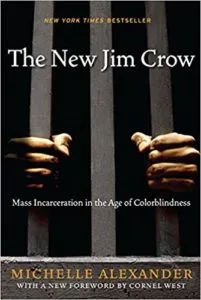 Former litigator-turned-legal-scholar Michelle Alexander provocatively argues that we have not ended racial caste in America: we have simply redesigned it. Alexander shows that, by targeting black men and decimating communities of color, the U.S. criminal justice system functions as a contemporary system of racial control, even as it formally adheres to the principle of color blindness. The New Jim Crow challenges the civil rights community—and all of us—to place mass incarceration at the forefront of a new movement for racial justice in America. For more books about racism and the law, check out this list.
Former litigator-turned-legal-scholar Michelle Alexander provocatively argues that we have not ended racial caste in America: we have simply redesigned it. Alexander shows that, by targeting black men and decimating communities of color, the U.S. criminal justice system functions as a contemporary system of racial control, even as it formally adheres to the principle of color blindness. The New Jim Crow challenges the civil rights community—and all of us—to place mass incarceration at the forefront of a new movement for racial justice in America. For more books about racism and the law, check out this list.
Benign Bigotry by Kristin J. Anderson
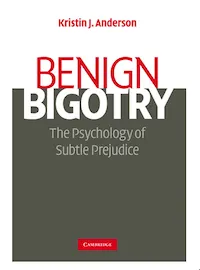 Benign Bigotry examines subtle prejudice by addressing six commonly held cultural myths based on assumptions that appear harmless but actually foster discrimination: those people all look alike; they must be guilty of something; feminists are man-haters; gays flaunt their sexuality; I’m not a racist, I’m color-blind; and affirmative action is reverse racism. Kristin J. Anderson skillfully relates each of these myths to real world events. She emphasizes how errors in individual thinking can affect society at large, and suggests strategies for reducing prejudice in daily life. You can find more books about racism via microaggressions here.
Benign Bigotry examines subtle prejudice by addressing six commonly held cultural myths based on assumptions that appear harmless but actually foster discrimination: those people all look alike; they must be guilty of something; feminists are man-haters; gays flaunt their sexuality; I’m not a racist, I’m color-blind; and affirmative action is reverse racism. Kristin J. Anderson skillfully relates each of these myths to real world events. She emphasizes how errors in individual thinking can affect society at large, and suggests strategies for reducing prejudice in daily life. You can find more books about racism via microaggressions here.
Borderlands/La Frontera by Gloria E. Anzuldua
 Anzaldua, a Chicana native of Texas, explores in prose and poetry the murky, precarious existence of those living on the frontier between cultures and languages. Writing in a lyrical mixture of Spanish and English that is her unique heritage, she meditates on the condition of Chicanos in Anglo culture, women in Hispanic culture, and lesbians in the straight world. Anzaldua is a rebellious and willful talent who recognizes that life on the border, “life in the shadows,” is vital territory for both literature and civilization. She has produced a powerful document that belongs in all collection of books about racism with emphasis on Hispanic American or feminist issues.
Anzaldua, a Chicana native of Texas, explores in prose and poetry the murky, precarious existence of those living on the frontier between cultures and languages. Writing in a lyrical mixture of Spanish and English that is her unique heritage, she meditates on the condition of Chicanos in Anglo culture, women in Hispanic culture, and lesbians in the straight world. Anzaldua is a rebellious and willful talent who recognizes that life on the border, “life in the shadows,” is vital territory for both literature and civilization. She has produced a powerful document that belongs in all collection of books about racism with emphasis on Hispanic American or feminist issues.
Collected Essays by James Baldwin
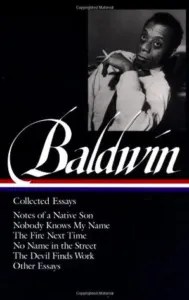 American novelist, playwright, essayist and activist James Baldwin was one of the 20th century’s strongest voices against racism. “Collected Essays” is the most comprehensive gathering of Baldwin’s nonfiction ever published. The collection confirms his as a uniquely prophetic voice in American letters, and was edited by Baldwin’s contemporary (and fellow cultural powerhouse) Toni Morrison.
For a bonus book about racism from Baldwin, his 1953 autobiography Go Tell It on the Mountain is a deeply felt memoir of his childhood in Harlem.
American novelist, playwright, essayist and activist James Baldwin was one of the 20th century’s strongest voices against racism. “Collected Essays” is the most comprehensive gathering of Baldwin’s nonfiction ever published. The collection confirms his as a uniquely prophetic voice in American letters, and was edited by Baldwin’s contemporary (and fellow cultural powerhouse) Toni Morrison.
For a bonus book about racism from Baldwin, his 1953 autobiography Go Tell It on the Mountain is a deeply felt memoir of his childhood in Harlem.
Racism Without Racists by Eduardo Bonilla-Silva
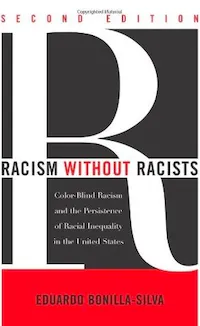 Alongside the subtle forms of discrimination typical of the post-Civil Rights era, new powerful ideology of “color-blind racism” has emerged. Bonilla-Silva documents how beneath the rhetorical maze of contemporary racial discourse lies a full-blown arsenal of arguments, phrases, and stories that whites use to account for and ultimately justify racial inequities.
Bonilla-Silva argues that the U.S. is developing a more complex and apparently “plural” racial order that will mimic Latin American patterns of racial stratification. In this highly acclaimed book, Bonilla-Silva challenges color-blind thinking.
Alongside the subtle forms of discrimination typical of the post-Civil Rights era, new powerful ideology of “color-blind racism” has emerged. Bonilla-Silva documents how beneath the rhetorical maze of contemporary racial discourse lies a full-blown arsenal of arguments, phrases, and stories that whites use to account for and ultimately justify racial inequities.
Bonilla-Silva argues that the U.S. is developing a more complex and apparently “plural” racial order that will mimic Latin American patterns of racial stratification. In this highly acclaimed book, Bonilla-Silva challenges color-blind thinking.
How Jews Became White Folks by Karen Brodkin
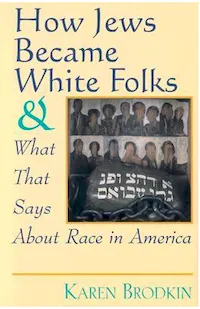 The history of Jews in the United States is one of racial change that provides useful insights on race in America. Prevailing classifications have sometimes assigned Jews to the white race. At other times they have created an off-white racial designation for them. Changes in racial assignment have shaped the ways American Jews of different eras have constructed their ethnoracial identities. Brodkin shows how Jews, in her opinion, experience a kind of double vision that comes from racial middleness. On the one hand, marginality with regard to whiteness; on the other, whiteness and belonging with regard to blackness.
The history of Jews in the United States is one of racial change that provides useful insights on race in America. Prevailing classifications have sometimes assigned Jews to the white race. At other times they have created an off-white racial designation for them. Changes in racial assignment have shaped the ways American Jews of different eras have constructed their ethnoracial identities. Brodkin shows how Jews, in her opinion, experience a kind of double vision that comes from racial middleness. On the one hand, marginality with regard to whiteness; on the other, whiteness and belonging with regard to blackness.
Invisible by Stephen L. Carter
 Eunice Hunton Carter was black and a woman and a prosecutor, a graduate of Smith College and the granddaughter of slaves, as dazzlingly unlikely a combination as one could imagine in New York of the 1930s. Without the strategy she devised, Lucky Luciano, the most powerful Mafia boss in history, would never have been convicted.
Invisible tells the true story of a woman who often found her path blocked by the social and political expectations of her time. But Eunice Carter never accepted defeat, and thanks to her grandson’s remarkable book, her long forgotten story is once again visible.
Eunice Hunton Carter was black and a woman and a prosecutor, a graduate of Smith College and the granddaughter of slaves, as dazzlingly unlikely a combination as one could imagine in New York of the 1930s. Without the strategy she devised, Lucky Luciano, the most powerful Mafia boss in history, would never have been convicted.
Invisible tells the true story of a woman who often found her path blocked by the social and political expectations of her time. But Eunice Carter never accepted defeat, and thanks to her grandson’s remarkable book, her long forgotten story is once again visible.
The Myth of the Model Minority by Rosalind S. Chou and Joe R. Feagin
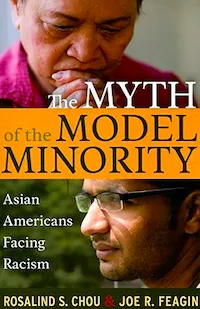 With their apparent success in schools and careers, Asian Americans have long been viewed by as the “model minority.” Yet few Americans realize the lives of many Asian Americans are constantly stressed by racism. Chou and Feagin assess racial stereotyping and discrimination from dozens of interviews across the country with Asian Americans in a variety of settings, from elementary schools to colleges, workplaces, and other public arenas. This book dispels notions that Asian Americans are universally “favored” by whites and have an easy time adapting to life in American society. The authors conclude with policy measures that can improve the lives not only of Asian Americans but also of other Americans of color.
With their apparent success in schools and careers, Asian Americans have long been viewed by as the “model minority.” Yet few Americans realize the lives of many Asian Americans are constantly stressed by racism. Chou and Feagin assess racial stereotyping and discrimination from dozens of interviews across the country with Asian Americans in a variety of settings, from elementary schools to colleges, workplaces, and other public arenas. This book dispels notions that Asian Americans are universally “favored” by whites and have an easy time adapting to life in American society. The authors conclude with policy measures that can improve the lives not only of Asian Americans but also of other Americans of color.
Why I’m No Longer Talking To White People About Race by Reni Eddo-Lodge
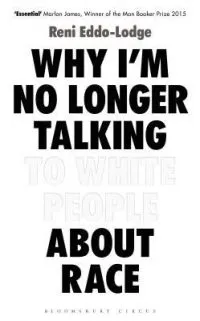 In 2014, award-winning journalist Reni Eddo-Lodge wrote about her frustration with the way that discussions of race and racism in Britain were being led by those who weren’t affected by it. She posted a piece on her blog, entitled ‘Why I’m No Longer Talking to White People About Race’ that led to this book.
Exploring issues from eradicated black history to the political purpose of white dominance, whitewashed feminism to the inextricable link between class and race, Reni Eddo-Lodge offers a timely and essential new framework for how to see, acknowledge and counter racism. It is a searing, illuminating, absolutely necessary exploration of what it is to be a person of color in Britain today.
For more books about racism in the UK, read here.
In 2014, award-winning journalist Reni Eddo-Lodge wrote about her frustration with the way that discussions of race and racism in Britain were being led by those who weren’t affected by it. She posted a piece on her blog, entitled ‘Why I’m No Longer Talking to White People About Race’ that led to this book.
Exploring issues from eradicated black history to the political purpose of white dominance, whitewashed feminism to the inextricable link between class and race, Reni Eddo-Lodge offers a timely and essential new framework for how to see, acknowledge and counter racism. It is a searing, illuminating, absolutely necessary exploration of what it is to be a person of color in Britain today.
For more books about racism in the UK, read here.
A Suitable Enemy by Liz Fekete
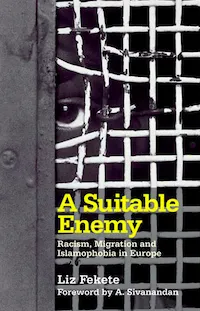 A Suitable Enemy draws on sixteen years of research to present a comprehensive overview of EU immigration, asylum, race and security policies.
Fekete argues that when as the EU introduced selective migration policies, it closed its borders against asylum seekers who were the first victims of the growth of the security state which now embraces Muslims. She explores the way in which anti-terrorist legislation has been used to evict undesirable migrants, how deportation policies commodify and dehumanize the most vulnerable and how these go hand in hand with evolving forms of racism, particularly Islamophobia.
A Suitable Enemy draws on sixteen years of research to present a comprehensive overview of EU immigration, asylum, race and security policies.
Fekete argues that when as the EU introduced selective migration policies, it closed its borders against asylum seekers who were the first victims of the growth of the security state which now embraces Muslims. She explores the way in which anti-terrorist legislation has been used to evict undesirable migrants, how deportation policies commodify and dehumanize the most vulnerable and how these go hand in hand with evolving forms of racism, particularly Islamophobia.
Killers of the Flower Moon by David Grann
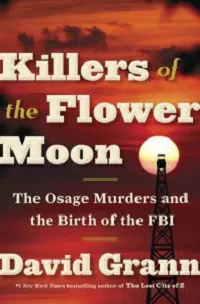 In the 1920s, the richest people per capita in the world were members of the Osage Indian Nation in Oklahoma. After oil was discovered beneath their land, the Osage rode in chauffeured automobiles, built mansions, and sent their children to study in Europe. Then, one by one, they began to be killed off.
As the death toll surpassed more than 24 Osage, the newly created FBI took up the case, in what became one of the organization’s first major homicide investigations. Together with the Osage they began to expose one of the most sinister conspiracies in American history.
In the 1920s, the richest people per capita in the world were members of the Osage Indian Nation in Oklahoma. After oil was discovered beneath their land, the Osage rode in chauffeured automobiles, built mansions, and sent their children to study in Europe. Then, one by one, they began to be killed off.
As the death toll surpassed more than 24 Osage, the newly created FBI took up the case, in what became one of the organization’s first major homicide investigations. Together with the Osage they began to expose one of the most sinister conspiracies in American history.
Roots by Alex Haley
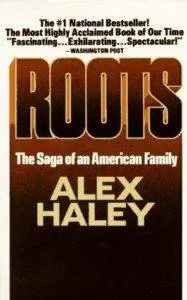 When he was a boy, Alex Haley’s grandmother used to tell him stories about their family—stories that went back to her grandparents, and their grandparents, down through the generations all the way to a man she called “the African.” Still vividly remembering the stories after he grew up and became a writer, Haley began to search for documentation that might authenticate the narrative.
As the first black American writer to trace his origins back to their roots, Haley has told the story of 25,000,000 Americans of African descent. He has rediscovered for an entire people a rich cultural heritage that slavery took away from them, along with their names and their identities.
When he was a boy, Alex Haley’s grandmother used to tell him stories about their family—stories that went back to her grandparents, and their grandparents, down through the generations all the way to a man she called “the African.” Still vividly remembering the stories after he grew up and became a writer, Haley began to search for documentation that might authenticate the narrative.
As the first black American writer to trace his origins back to their roots, Haley has told the story of 25,000,000 Americans of African descent. He has rediscovered for an entire people a rich cultural heritage that slavery took away from them, along with their names and their identities.
Ain’t I a Woman by bell hooks
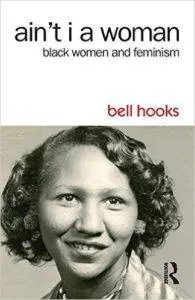 A groundbreaking work of feminist history and theory analyzing the complex relations between various forms of oppression. Ain’t I a Woman examines the impact of sexism on black women during slavery, the historic devaluation of black womanhood, black male sexism, racism within the recent women’s movement, and black women’s involvement with feminism.
Here are more books about racism and feminism from The Root.
A groundbreaking work of feminist history and theory analyzing the complex relations between various forms of oppression. Ain’t I a Woman examines the impact of sexism on black women during slavery, the historic devaluation of black womanhood, black male sexism, racism within the recent women’s movement, and black women’s involvement with feminism.
Here are more books about racism and feminism from The Root.
Bad Blood by James H. Jones
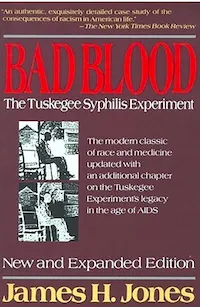 From 1932 to 1972, the United States Public Health Service conducted a non-therapeutic experiment involving over 400 black male sharecroppers infected with syphilis. The Tuskegee Study’s purpose was to trace the spontaneous evolution of the disease in order to learn how syphilis affected black subjects. The men were not told they had syphilis; they were not warned about what the disease might do to them; and, with the exception of a smattering of medication during the first few months, they were not given health care. Tracing the evolution of medical ethics and the nature of decision making in bureaucracies, Jones attempted to show that the Tuskegee Study was not an aberration, but a logical outgrowth of race relations and medical practice in the United States.
From 1932 to 1972, the United States Public Health Service conducted a non-therapeutic experiment involving over 400 black male sharecroppers infected with syphilis. The Tuskegee Study’s purpose was to trace the spontaneous evolution of the disease in order to learn how syphilis affected black subjects. The men were not told they had syphilis; they were not warned about what the disease might do to them; and, with the exception of a smattering of medication during the first few months, they were not given health care. Tracing the evolution of medical ethics and the nature of decision making in bureaucracies, Jones attempted to show that the Tuskegee Study was not an aberration, but a logical outgrowth of race relations and medical practice in the United States.
When Affirmative Action Was White by Ira Katznelson
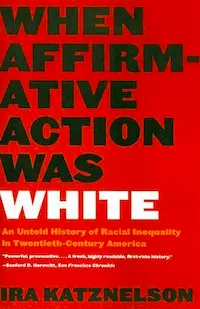 In this “penetrating new analysis” (New York Times Book Review) Ira Katznelson fundamentally recasts our understanding of twentieth-century American history and demonstrates that all the key programs passed during the New Deal and Fair Deal era of the 1930s and 1940s were created in a deeply discriminatory manner. Through mechanisms designed by Southern Democrats that specifically excluded maids and farm workers, the gap between blacks and whites actually widened despite postwar prosperity.
Look here for more books about racism and affirmative action.
In this “penetrating new analysis” (New York Times Book Review) Ira Katznelson fundamentally recasts our understanding of twentieth-century American history and demonstrates that all the key programs passed during the New Deal and Fair Deal era of the 1930s and 1940s were created in a deeply discriminatory manner. Through mechanisms designed by Southern Democrats that specifically excluded maids and farm workers, the gap between blacks and whites actually widened despite postwar prosperity.
Look here for more books about racism and affirmative action.
Hood Feminism by Mikki Kendall
 In her searing collection of essays, Mikki Kendall takes aim at the legitimacy of the modern feminist movement arguing that it has chronically failed to address the needs of all but a few women. Drawing on her own experiences with hunger, violence, and hyper-sexualization, along with incisive commentary on politics, pop culture, the stigma of mental health, and more, Hood Feminism delivers an irrefutable indictment of a movement in flux. An unforgettable read, Kendall has written a ferocious clarion call to all would-be feminists to live out the true mandate of the movement in thought and in deed.
In her searing collection of essays, Mikki Kendall takes aim at the legitimacy of the modern feminist movement arguing that it has chronically failed to address the needs of all but a few women. Drawing on her own experiences with hunger, violence, and hyper-sexualization, along with incisive commentary on politics, pop culture, the stigma of mental health, and more, Hood Feminism delivers an irrefutable indictment of a movement in flux. An unforgettable read, Kendall has written a ferocious clarion call to all would-be feminists to live out the true mandate of the movement in thought and in deed.
The Muslims Are Coming! by Arun Kundnani
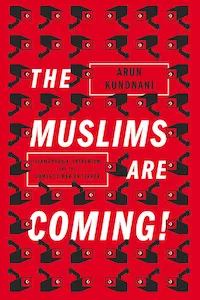 The new front in the War on Terror is the “homegrown enemy,” domestic terrorists who have become the focus of sprawling counterterrorism structures of policing and surveillance in the United States and across Europe. Based on years of research and reportage and written in engrossing, precise prose, this is the first comprehensive critique of counter-radicalization strategies. The new policy and policing campaigns have been backed by an industry of freshly minted experts and liberal commentators. The Muslims Are Coming! looks at the way these debates have been transformed by the embrace of a narrowly configured and ill-conceived anti-extremism.
The new front in the War on Terror is the “homegrown enemy,” domestic terrorists who have become the focus of sprawling counterterrorism structures of policing and surveillance in the United States and across Europe. Based on years of research and reportage and written in engrossing, precise prose, this is the first comprehensive critique of counter-radicalization strategies. The new policy and policing campaigns have been backed by an industry of freshly minted experts and liberal commentators. The Muslims Are Coming! looks at the way these debates have been transformed by the embrace of a narrowly configured and ill-conceived anti-extremism.
The March Trilogy by John Lewis
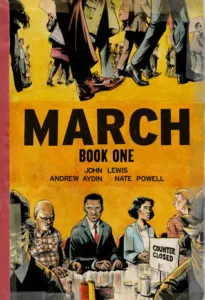 March is a vivid first-hand account of John Lewis’ lifelong struggle for civil and human rights, meditating in the modern age on the distance traveled since the days of Jim Crow and segregation. Rooted in Lewis’ personal story, it also reflects on the highs and lows of the broader civil rights movement.
Many years ago, John Lewis and other student activists drew inspiration from the 1950s comic book “Martin Luther King and the Montgomery Story.” Now, his own comics bring those days to life for a new audience, testifying to a movement whose echoes will be heard for generations.
Find more books on racism and the civil rights era here.
March is a vivid first-hand account of John Lewis’ lifelong struggle for civil and human rights, meditating in the modern age on the distance traveled since the days of Jim Crow and segregation. Rooted in Lewis’ personal story, it also reflects on the highs and lows of the broader civil rights movement.
Many years ago, John Lewis and other student activists drew inspiration from the 1950s comic book “Martin Luther King and the Montgomery Story.” Now, his own comics bring those days to life for a new audience, testifying to a movement whose echoes will be heard for generations.
Find more books on racism and the civil rights era here.
They Can’t Kill Us All by Wesley Lowery
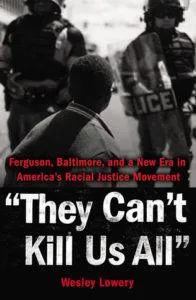 Studded with moments of joy, and tragedy, They Can’t Kill Us All offers a historically informed look at the standoff between the police and those they are sworn to protect, showing that civil unrest is just one tool of resistance in the broader struggle for justice. As Lowery brings vividly to life, the protests against police killings are also about the black community’s long history on the receiving end of perceived and actual acts of injustice and discrimination. They Can’t Kill Us All grapples with a persistent if also largely unexamined aspect of the otherwise transformative presidency of Barack Obama: the failure to deliver tangible security and opportunity to those Americans most in need of both.
Studded with moments of joy, and tragedy, They Can’t Kill Us All offers a historically informed look at the standoff between the police and those they are sworn to protect, showing that civil unrest is just one tool of resistance in the broader struggle for justice. As Lowery brings vividly to life, the protests against police killings are also about the black community’s long history on the receiving end of perceived and actual acts of injustice and discrimination. They Can’t Kill Us All grapples with a persistent if also largely unexamined aspect of the otherwise transformative presidency of Barack Obama: the failure to deliver tangible security and opportunity to those Americans most in need of both.
Obstruction of Justice by Ray Machaulko
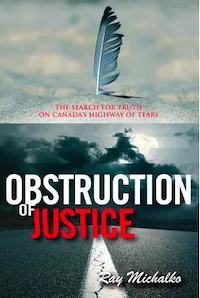 “The Highway of Tears” is a lonely seven hundred kilometer stretch of road that winds through the Coast Mountains wilderness of British Columbia. Over the last four decades nine young women have been murdered or gone missing from this remote highway. All but one were Aboriginal. To date not one case has been solved.
Fueled by frustration with the police’s inability to solve any of these crimes, inspired by the belief that someone somewhere knew something, and driven by his inexplicable personal commitment, ex-RCMP turned private eye Ray Michalko embarked on a life altering journey to unlock the secrets of these cases and, in the process, discovered as much about the crimes as he did the reasons they’ve gone unsolved.
You can find more books about racism towards indigenous Canadians from Book Riot here.
“The Highway of Tears” is a lonely seven hundred kilometer stretch of road that winds through the Coast Mountains wilderness of British Columbia. Over the last four decades nine young women have been murdered or gone missing from this remote highway. All but one were Aboriginal. To date not one case has been solved.
Fueled by frustration with the police’s inability to solve any of these crimes, inspired by the belief that someone somewhere knew something, and driven by his inexplicable personal commitment, ex-RCMP turned private eye Ray Michalko embarked on a life altering journey to unlock the secrets of these cases and, in the process, discovered as much about the crimes as he did the reasons they’ve gone unsolved.
You can find more books about racism towards indigenous Canadians from Book Riot here.
Long Walk to Freedom by Nelson Mandela
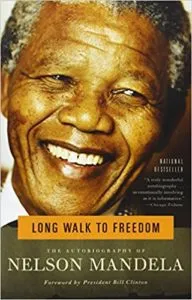 Since his triumphant release in 1990 from more than a quarter-century of imprisonment, Nelson Mandela has been at the center of the most compelling and inspiring political drama in the world. As president of the African National Congress and head of South Africa’s anti-apartheid movement, he was instrumental in moving the nation toward multiracial government and majority rule. He is revered everywhere as a vital force in the fight for human rights and racial equality.
Since his triumphant release in 1990 from more than a quarter-century of imprisonment, Nelson Mandela has been at the center of the most compelling and inspiring political drama in the world. As president of the African National Congress and head of South Africa’s anti-apartheid movement, he was instrumental in moving the nation toward multiracial government and majority rule. He is revered everywhere as a vital force in the fight for human rights and racial equality.
My Grandmother’s Hands by Resmaa Menakem
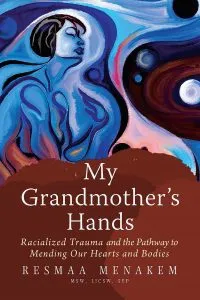 In this groundbreaking work, therapist Resmaa Menakem examines the damage caused by racism in America from the perspective of body-centered psychology. He argues this destruction will continue until Americans learn to heal the generational anguish of white supremacy, which is deeply embedded in all our bodies. Our collective agony doesn’t just affect African Americans. White Americans suffer their own secondary trauma as well. So do blue Americans—our police.
My Grandmother’s Hands is a call to action for all of us to recognize that racism is not about the head, but about the body, and introduces an alternative view of what we can do to grow beyond our entrenched racialized divide.
In this groundbreaking work, therapist Resmaa Menakem examines the damage caused by racism in America from the perspective of body-centered psychology. He argues this destruction will continue until Americans learn to heal the generational anguish of white supremacy, which is deeply embedded in all our bodies. Our collective agony doesn’t just affect African Americans. White Americans suffer their own secondary trauma as well. So do blue Americans—our police.
My Grandmother’s Hands is a call to action for all of us to recognize that racism is not about the head, but about the body, and introduces an alternative view of what we can do to grow beyond our entrenched racialized divide.
Barracoon by Zora Neale Hurston
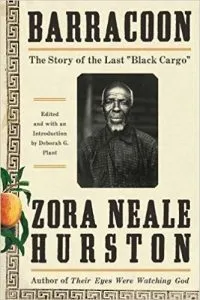 In 1927, Zora Neale Hurston went to Plateau, Alabama, just outside Mobile, to interview eighty-six-year-old Cudjo Lewis. Hurston was there to record Cudjo’s firsthand account of the raid that led to his capture and bondage fifty years after the Atlantic slave trade was outlawed in the United States.
Based on those interviews, featuring Cudjo’s unique vernacular, and written from Hurston’s perspective with the compassion and singular style that have made her one of the preeminent American authors of the twentieth-century, Barracoon masterfully illustrates the tragedy of slavery and of one life forever defined by it.
In 1927, Zora Neale Hurston went to Plateau, Alabama, just outside Mobile, to interview eighty-six-year-old Cudjo Lewis. Hurston was there to record Cudjo’s firsthand account of the raid that led to his capture and bondage fifty years after the Atlantic slave trade was outlawed in the United States.
Based on those interviews, featuring Cudjo’s unique vernacular, and written from Hurston’s perspective with the compassion and singular style that have made her one of the preeminent American authors of the twentieth-century, Barracoon masterfully illustrates the tragedy of slavery and of one life forever defined by it.
Born a Crime by Trevor Noah
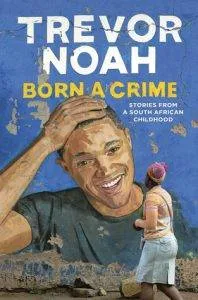 Trevor Noah’s unlikely path from apartheid South Africa to the desk of The Daily Show began with a criminal act: his birth. Trevor was born to a white Swiss father and a black Xhosa mother at a time when such a union was punishable by five years in prison. Living proof of his parents’ indiscretion, Trevor was kept mostly indoors for the earliest years of his life, bound by the extreme and often absurd measures his mother took to hide him from a government that could, at any moment, steal him away. Finally liberated by the end of South Africa’s tyrannical white rule, Trevor and his mother set forth on a grand adventure, living openly and freely and embracing the opportunities won by a centuries-long struggle.
Trevor Noah’s unlikely path from apartheid South Africa to the desk of The Daily Show began with a criminal act: his birth. Trevor was born to a white Swiss father and a black Xhosa mother at a time when such a union was punishable by five years in prison. Living proof of his parents’ indiscretion, Trevor was kept mostly indoors for the earliest years of his life, bound by the extreme and often absurd measures his mother took to hide him from a government that could, at any moment, steal him away. Finally liberated by the end of South Africa’s tyrannical white rule, Trevor and his mother set forth on a grand adventure, living openly and freely and embracing the opportunities won by a centuries-long struggle.
Dreams from My Father by Barack Obama
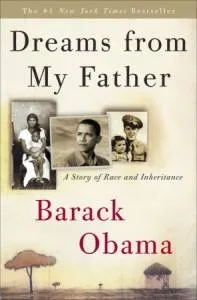 In this lyrical, unsentimental, and compelling memoir, the son of a black African father and a white American mother searches for a workable meaning to his life as a black American. It begins in New York, where Barack Obama learns that his father—a figure he knows more as a myth than as a man—has been killed in a car accident. This sudden death inspires an emotional odyssey—first to a small town in Kansas, from which he retraces the migration of his mother’s family to Hawaii, and then to Kenya, where he meets the African side of his family, confronts the bitter truth of his father’s life, and at last reconciles his divided inheritance.
In this lyrical, unsentimental, and compelling memoir, the son of a black African father and a white American mother searches for a workable meaning to his life as a black American. It begins in New York, where Barack Obama learns that his father—a figure he knows more as a myth than as a man—has been killed in a car accident. This sudden death inspires an emotional odyssey—first to a small town in Kansas, from which he retraces the migration of his mother’s family to Hawaii, and then to Kenya, where he meets the African side of his family, confronts the bitter truth of his father’s life, and at last reconciles his divided inheritance.
Notes from a Young Black Chef by Kwame Onwuachi
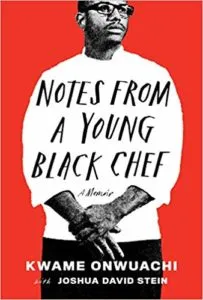 In this inspiring memoir, Kwame Onwuachi shares the remarkable story of his culinary coming-of-age. He launched his own catering company with twenty thousand dollars he made selling candy on the subway, and trained in the kitchens of some of the most acclaimed restaurants in the country. But the road to success is riddled with potholes. As a young chef, Onwuachi was forced to grapple with just how unwelcoming the world of fine dining can be for people of color, and his first restaurant, the culmination of years of planning, shuttered just months after opening. A powerful, heartfelt, and shockingly honest memoir of following your dreams—even when they don’t turn out as you expected—Notes from a Young Black Chef is one man’s pursuit of his passions, despite the odds.
In this inspiring memoir, Kwame Onwuachi shares the remarkable story of his culinary coming-of-age. He launched his own catering company with twenty thousand dollars he made selling candy on the subway, and trained in the kitchens of some of the most acclaimed restaurants in the country. But the road to success is riddled with potholes. As a young chef, Onwuachi was forced to grapple with just how unwelcoming the world of fine dining can be for people of color, and his first restaurant, the culmination of years of planning, shuttered just months after opening. A powerful, heartfelt, and shockingly honest memoir of following your dreams—even when they don’t turn out as you expected—Notes from a Young Black Chef is one man’s pursuit of his passions, despite the odds.
Black Star by Anandi Ramamurthy
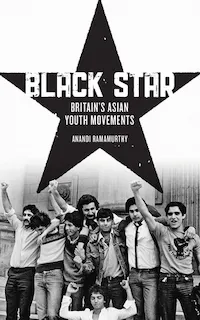 Black Star documents the vibrant Asian Youth Movements in 1970s and ’80s Britain who struggled against the racism of the street and the state. Anandi Ramamurthy shows how they drew inspiration from Black Power movements as well as anti-imperialist and workers’ struggles across the globe.
Drawing on her intimate knowledge and extensive research, Ramamurthy shows how the struggle to make Britain ‘home’ led to a broad-based identity where ‘black’ was a political color inspiring unity amongst all those struggling against racism.
Black Star documents the vibrant Asian Youth Movements in 1970s and ’80s Britain who struggled against the racism of the street and the state. Anandi Ramamurthy shows how they drew inspiration from Black Power movements as well as anti-imperialist and workers’ struggles across the globe.
Drawing on her intimate knowledge and extensive research, Ramamurthy shows how the struggle to make Britain ‘home’ led to a broad-based identity where ‘black’ was a political color inspiring unity amongst all those struggling against racism.
You Can’t Touch My Hair by Phoebe Robinson
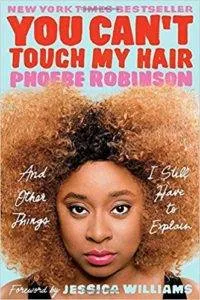 Phoebe Robinson is a stand-up comic, which means that, often, her everyday experiences become points of comedic fodder. And as a black woman in America, she maintains, sometimes you need to have a sense of humor to deal with the absurdity you are handed on the daily. Robinson has experienced her fair share over the years: she’s been unceremoniously relegated to the role of “the black friend,” as if she is somehow the authority on all things racial. She’s been questioned about her love of U2 and Billy Joel (“isn’t that…white people music?”). She’s been followed around stores by security guards; and yes, people do ask her whether they can touch her hair all. the. time. Now, she’s ready to take these topics to the page and she s going to make you laugh as she s doing it.
Phoebe Robinson is a stand-up comic, which means that, often, her everyday experiences become points of comedic fodder. And as a black woman in America, she maintains, sometimes you need to have a sense of humor to deal with the absurdity you are handed on the daily. Robinson has experienced her fair share over the years: she’s been unceremoniously relegated to the role of “the black friend,” as if she is somehow the authority on all things racial. She’s been questioned about her love of U2 and Billy Joel (“isn’t that…white people music?”). She’s been followed around stores by security guards; and yes, people do ask her whether they can touch her hair all. the. time. Now, she’s ready to take these topics to the page and she s going to make you laugh as she s doing it.
Barrio America by A.K. Sandoval-Strausz
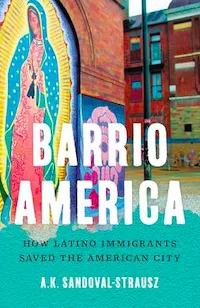 Thirty years ago, most people were ready to give up on American cities. We are commonly told that it was a “creative class” of young professionals who revived a moribund urban America in the 1990s and 2000s. But this stunning reversal owes much more to another, far less visible group: Latino and Latina newcomers.
Award-winning historian A. K. Sandoval-Strausz reveals this history by focusing on two barrios: Chicago’s Little Village and Dallas’s Oak Cliff. These neighborhoods lost residents and jobs for decades before Latin American immigration turned them around in the 1970s. Barrio America uses vivid oral histories and detailed statistics to show how the great Latino migrations transformed America for the better.
Thirty years ago, most people were ready to give up on American cities. We are commonly told that it was a “creative class” of young professionals who revived a moribund urban America in the 1990s and 2000s. But this stunning reversal owes much more to another, far less visible group: Latino and Latina newcomers.
Award-winning historian A. K. Sandoval-Strausz reveals this history by focusing on two barrios: Chicago’s Little Village and Dallas’s Oak Cliff. These neighborhoods lost residents and jobs for decades before Latin American immigration turned them around in the 1970s. Barrio America uses vivid oral histories and detailed statistics to show how the great Latino migrations transformed America for the better.
Sigh, Gone by Phuc Tran
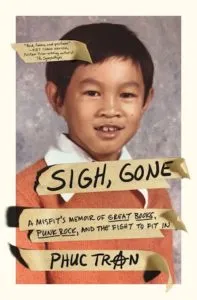 In 1975, during the fall of Saigon, Phuc Tran immigrates to America along with his family. By sheer chance they land in Carlisle, Pennsylvania, a small town where the Trans struggle to assimilate into their new life. In this coming-of-age memoir told through the themes of great books such as The Metamorphosis, The Scarlet Letter, The Iliad, and more, Tran navigates the push and pull of finding and accepting himself despite the challenges of immigration, feelings of isolation, and teenage rebellion, all while attempting to meet the rigid expectations set by his immigrant parents. In his journey for self-discovery Tran ultimately finds refuge and inspiration in the art that shapes—and ultimately saves—him.
In 1975, during the fall of Saigon, Phuc Tran immigrates to America along with his family. By sheer chance they land in Carlisle, Pennsylvania, a small town where the Trans struggle to assimilate into their new life. In this coming-of-age memoir told through the themes of great books such as The Metamorphosis, The Scarlet Letter, The Iliad, and more, Tran navigates the push and pull of finding and accepting himself despite the challenges of immigration, feelings of isolation, and teenage rebellion, all while attempting to meet the rigid expectations set by his immigrant parents. In his journey for self-discovery Tran ultimately finds refuge and inspiration in the art that shapes—and ultimately saves—him.
Race Matters by Cornel West
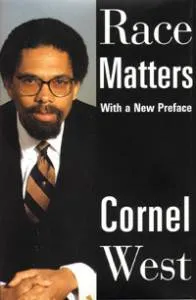 In this essay collection, many of which have previously appeared in journals, West, the director of Afro-American studies at Princeton & author of several books, addresses a number of issues of concern to black Americans: the LA riots after the Rodney King verdict; Malcolm X; Clarence Thomas & Anita Hill; & black street life. These topics represent the continuing struggle to include African Americans in mainstream American political, economic & social life without destroying their unique culture. Already well known in scholarly circles, he’s increasingly becoming more visible to the general public. This book should make his essays more accessible to a greater number of people.
In this essay collection, many of which have previously appeared in journals, West, the director of Afro-American studies at Princeton & author of several books, addresses a number of issues of concern to black Americans: the LA riots after the Rodney King verdict; Malcolm X; Clarence Thomas & Anita Hill; & black street life. These topics represent the continuing struggle to include African Americans in mainstream American political, economic & social life without destroying their unique culture. Already well known in scholarly circles, he’s increasingly becoming more visible to the general public. This book should make his essays more accessible to a greater number of people.
Night by Elie Wiesel
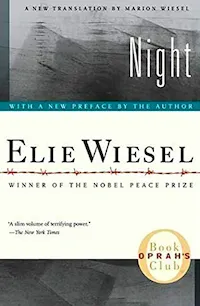 Born in the town of Sighet, Transylvania, Elie Wiesel was a teenager when he and his family were taken from their home in 1944 to Auschwitz concentration camp, and then to Buchenwald. Night is the terrifying record of Elie Wiesel’s memories of the death of his family, the death of his own innocence, and his despair as a deeply observant Jew confronting the absolute evil of man. This new translation by his wife and most frequent translator, Marion Wiesel, corrects important details and presents the most accurate rendering in English of Elie Wiesel’s testimony to what happened in the camps and of his unforgettable message that this horror must simply never be allowed to happen again.
Born in the town of Sighet, Transylvania, Elie Wiesel was a teenager when he and his family were taken from their home in 1944 to Auschwitz concentration camp, and then to Buchenwald. Night is the terrifying record of Elie Wiesel’s memories of the death of his family, the death of his own innocence, and his despair as a deeply observant Jew confronting the absolute evil of man. This new translation by his wife and most frequent translator, Marion Wiesel, corrects important details and presents the most accurate rendering in English of Elie Wiesel’s testimony to what happened in the camps and of his unforgettable message that this horror must simply never be allowed to happen again.
 Race Talk and the Conspiracy of Silence by Derald Wing Sue
Race Talk and the Conspiracy of Silence by Derald Wing Sue
A guide for facilitating and participating in difficult dialogues about race, author Derald Wing Sue – an internationally recognized expert on multiculturalism, diversity, and microaggressions – explores the characteristics, dynamics, and meaning behind discussions about race as well as the hidden “ground rules” that inhibit honest and productive dialogue. Through emotional and visceral examples, this book explains why conversations revolving around racial issues are so difficult, and provides guidelines, techniques, and advice for navigating and leading honest and forthright discussions.
Read here for more books about racism and how white people can discuss it more constructively.
Alien Nation by Elliot Young
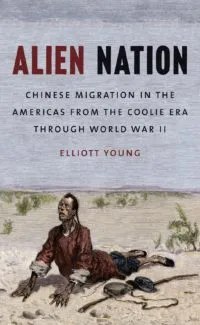 In this sweeping work, Elliott Young traces the pivotal century of Chinese migration to the Americas, beginning with the 1840s at the start of the “coolie” trade and ending during World War II. The Chinese came as laborers, streaming across borders legally and illegally and working jobs few others wanted. Though nations were built in part from their labor, Young argues that they were the first group of migrants to bear the stigma of being “alien.”
This book is the first transnational history of Chinese migration to the Americas. By focusing on the fluidity and complexity of border crossings throughout the Western Hemisphere, Young shows us how Chinese migrants constructed alternative communities and identities through these transnational pathways.
Find more books about racism towards China from Book Riot.
In this sweeping work, Elliott Young traces the pivotal century of Chinese migration to the Americas, beginning with the 1840s at the start of the “coolie” trade and ending during World War II. The Chinese came as laborers, streaming across borders legally and illegally and working jobs few others wanted. Though nations were built in part from their labor, Young argues that they were the first group of migrants to bear the stigma of being “alien.”
This book is the first transnational history of Chinese migration to the Americas. By focusing on the fluidity and complexity of border crossings throughout the Western Hemisphere, Young shows us how Chinese migrants constructed alternative communities and identities through these transnational pathways.
Find more books about racism towards China from Book Riot.
Unaccompanied by Javier Zamora
 Zamora’s debut cradles within it a family’s risky song of longing and love for a country torn apart by war and gang violence. These poems recall and are rooted in the experiences of a nine-year-old boy traveling alone for thousands of miles and confronting everywhere the realities of borderland politics, racism, and economic injustice. Calling into question the concept of the American Dream, Zamora reimagines home, fusing music and memory to address the quandaries that tear families apart and—if we’re lucky—inspire the building of lives anew.
Zamora’s debut cradles within it a family’s risky song of longing and love for a country torn apart by war and gang violence. These poems recall and are rooted in the experiences of a nine-year-old boy traveling alone for thousands of miles and confronting everywhere the realities of borderland politics, racism, and economic injustice. Calling into question the concept of the American Dream, Zamora reimagines home, fusing music and memory to address the quandaries that tear families apart and—if we’re lucky—inspire the building of lives anew.
From pithy memoirs to meticulously researched examinations, the scope of books about racism is enormous. Whether you’re newly exploring the topic of discrimination, or you’re well-read on the subject, there are always new perspectives worth exploring. Most of the books on this list provide an enjoyable reading experience. All of them contribute to the larger conversation we as a society must have in order to rid ourselves of the unconscious biases and harmful messages that contributes to racism.



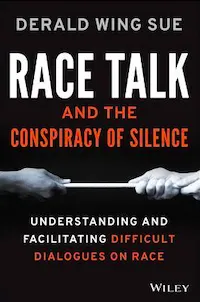 Race Talk and the Conspiracy of Silence
Race Talk and the Conspiracy of Silence







